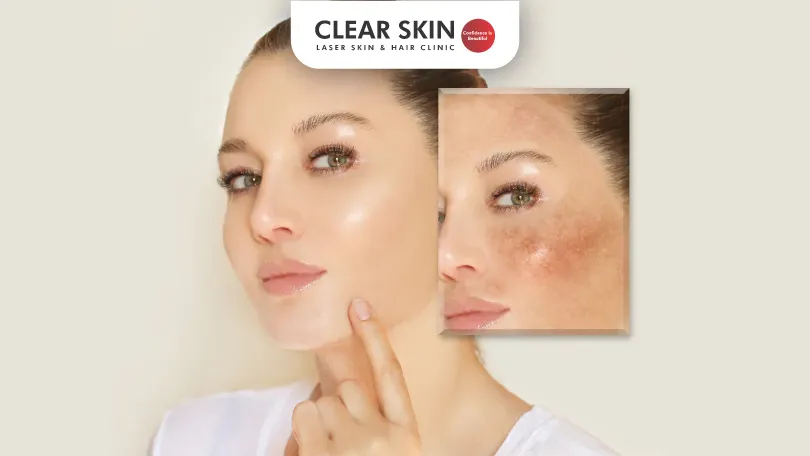How to treat Melasma effectively with Topical medications?
Reviewed By: Dr Dhananjay chavan
Updated on: 26th November, 2024

Are you tired of feeling self-conscious about those unsightly brown patches on your face? Do you struggle to cover them up with makeup every day?
If you are dealing with melasma, you are not alone. This common skin condition can be a source of significant emotional distress and frustration for many people. But fear not; there are effective ways to treat melasma, and using a cream for melasma is one of them.
In this article, we will explore some of the most effective topical treatments for melasma and provide the information you need to start your journey towards clearer, brighter skin.
Let’s explore!
Melasma is a common skin condition characterised by brown or greyish-brown patches on the face, particularly on the cheeks, forehead, nose, and upper lip. It’s often associated with hormonal changes, sun exposure, and genetic factors. While it’s not harmful, melasma can be a source of significant emotional distress and self-consciousness for some people.
Table Of Content
- Topical treatments for Melasma
- Conclusion
Topical treatments for Melasma
Fortunately, several topical treatments can effectively manage Melasma.
Here are some of the most common options:
Hydroquinone Cream
Hydroquinone cream is the best skin-lightening cream for melasma, and this cream works by inhibiting melanin pigment production. It is a prescription medicine and comes in concentrations of 2% and 4%, and it’s usually prescribed to apply it once daily for several months.
However, hydroquinone can increase sun sensitivity, so it’s crucial to use sun protection while using this cream. With consistent use, as prescribed by the doctor and proper sun protection, hydroquinone cream can help improve the appearance of melasma and restore your skin’s natural radiance.
Tretinoin Cream
This vitamin A derivative is commonly used for acne treatment but has also been effective in treating melasma. Tretinoin cream works by increasing skin cell turnover and thus removing the melanin. . It’s a retinoid that’s typically applied once daily at night and is often used with hydroquinone cream for melasma. It can take up to 12 weeks to see improvement in melasma symptoms.
Tretinoin too is a prescription medicine and requires a dermatologist’s prescription. It is not recommended during pregnancy as it can hamper the growing fetus.
Azelaic Acid
Azelaic acid is a skin-lightening agent that can help even out skin tone and reduce the appearance of hyperpigmentation, including melasma. It works by inhibiting the production of melanin and increasing skin cell turnover.
Compared to other topical creams for melasma, such as hydroquinone, azelaic acid is considered fairly gentle and can be used long-term without the risk of skin irritation or other side effects. However, as with any skincare product, it’s important to use azelaic acid as directed and consult a dermatologist if you have any concerns or questions about its use.
Kojic Acid
Kojic acid is derived from mushrooms and is a natural alternative to hydroquinone, another commonly used melasma treatment. Kojic acid works by inhibiting the production of melanin, the pigment responsible for skin colour, reducing the appearance of dark patches caused by melasma.
Topical Corticosteroids
Topical corticosteroids, also known as steroid creams, are anti-inflammatory medications commonly used to treat various skin conditions, including melasma. While they can have mild skin-lightening effects, topical corticosteroids are not typically used as a primary treatment for melasma.
In some cases, topical corticosteroids may be prescribed for melasma as part of combination therapy with other topical creams for melasma, such as hydroquinone or tretinoin. The corticosteroid may help reduce inflammation and redness associated with melasma, while the other topical treatments reduce the appearance of dark patches and promote skin cell turnover.
While these creams can effectively treat melasma, they can also have side effects. Talking to your dermatologist before starting any new treatment regimen is important. Additionally, sun protection is critical when treating melasma, as exposure to UV radiation can worsen the condition.
Do You Know?
Roughly 250 Patients Are Treated
Everyday By These Dermatologists
(You are one click away from flawless skin)
Meet Our Dermatologist!
Conclusion
Melasma can be a frustrating skin condition to deal with, but there are effective treatment options available. Topical creams for melasma, such as hydroquinone, tretinoin, kojic acid, and azelaic acid, can reduce the appearance of dark patches and even skin tone. However, using these creams under the guidance and supervision of an experienced dermatologist is important, as they can have side effects and may not be effective for everyone.
At Clear Skin Clinics Pune, our dermatologists can help determine the best treatment course based on your needs and skin type and with the right combination of topical medications, sun protection, and other skincare practices.
Further Reading
Do Acne Scar Removal Creams Really Work?
Discover do acne scar removal creams really work. Learn about the best ingredients and treatments to fade acne scars at Clear Skin Pune
Acne Pustules: How to Get Rid of Pustules?
Learn about causes, symptoms, and treatments from Dr. Dhanraj Chavan.
Is Tretinoin Cream Safe for Melasma? Tips and Usage Guide
Discover how tretinoin cream can safely treat melasma.
Unveiling the Potential of Face Packs for Acne Scars
Discover how homemade and customized face packs can help lighten acne marks and rejuvenate your skin.
Have thoughts? Please let us know
We are committed not only to treating you, but also educating you.






